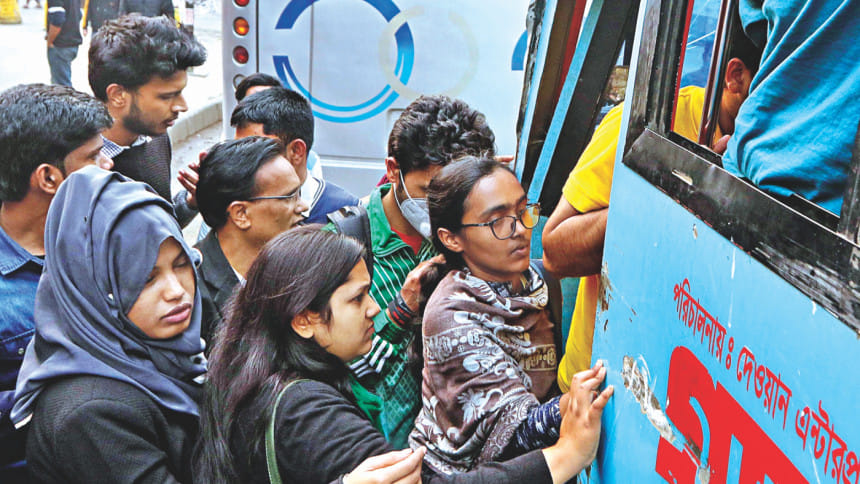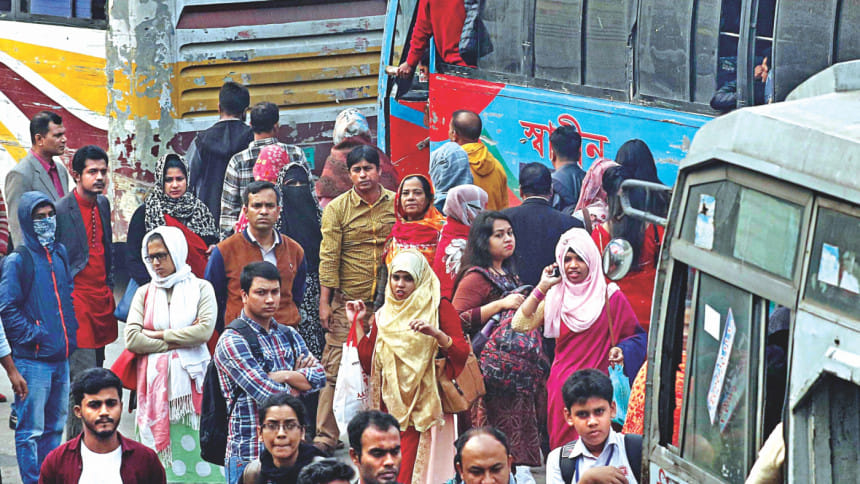A city free of fear: what women voters want

A 21-year-old DU student was raped and tortured in a notoriously dark stretch of the Airport Road in Kurmitola on the evening of January 5. The lone suspect, who was arrested a few days later, had allegedly raped and mugged other women near the spot in the past.
It might have worked as a wake-up call for the authorities as, after the incident, out-of-order street lights were fixed and new ones added to make the place properly lit.
However, there are numerous other places in the capital that lack adequate lighting as well as security, making women, in particular, vulnerable to sexual harassment and mugging.
This is what makes Noor Jahan Khatun, from Gandaria in Old Dhaka, feel insecure while moving around at night, especially when violence against women, particularly rape, is on the rise.

“I want a women-friendly Dhaka so we can move around without fear,” she told The Daily Star when asked what she wants of the custodians of the capital city.
She is one of 50 women voters The Daily Star talked to about their expectations from the aspiring mayor and councillor candidates for the two city corporations.
The elections to the posts of two mayors and 111 councillors will be held on February 1. According to Election Commission data, out of a total 5,463,467 voters in Dhaka South and Dhaka North city corporations, 2,620,459 are female.
Echoing Noor Jahan’s view, other women voters also said safety and security while moving around in the city are their main demand.
There could be arguments that their demand for security and safety has more to do with law enforcement agencies rather than the city corporations.
But Rumana, a resident of Lalmatia, poignantly put this demand into perspective. “We expect our mayors and councillors to take immediate measures to install powerful street lights so that we can feel comfortable moving around at night.”
There are roads in Lalmatia that remain dark at night, making her feel unsafe, added Rumana, who works in a private company.
Shahida Quader, a homemaker in Khilgaon, also calls for a safe environment in her locality so that women and female students can move around safely, especially at night.
Awareness campaigns on public safety issues and mobilising local people to ensure it collectively is a responsibility of councillors, as clearly defined in the City Corporation Rules 2012.
The city corporation authorities will have to make all footpaths free of encroachers and improve street lighting to ensure pedestrian mobility, and that of women in particular.
They will also have to play a vital role in coordinating with law enforcement personnel at the local level to ensure security of women, said some of the voters this newspaper spoke to.
A 2017 poll by the Thomson Reuters Foundation listed Dhaka as the seventh worst megacity for women. It was also listed as the fourth most dangerous city in the world in terms of sexual violence faced by women.
Another major demand The Daily Star heard was safe, secure and hassle-free public transport for women.
According to a 2017 Brac study, 94 percent of women commuting on public transport experience some form of sexual harassment.
So far, several women-only bus services and ride-sharing apps have been introduced. However, these are limited in routes and passenger reach -- there are only 15 buses dedicated for women.
Apart from security concerns, the women voters also highlighted other civic amenities they desperately need.
Uninterrupted utility services such as gas and water, for instance, are problems they want public representatives to pay greater attention to.
Shahina Akhtar, a resident of Jatrabari, said scarcity of safe drinking water, waterlogging, and mosquitoes are common problems in her locality.
“I do not want much from our mayor or councillor. I just want to be able to stay home comfortably,” she said. She added that the mayors should take proper steps to reduce the prices of essentials, citing the high prices of vegetables this winter.
Shaheda Ferdousi, a resident of Jhikatola, said women need more public toilets. “While on the move, we do not find any public toilets. This is not just an inconvenience but a health hazard,” she said.
Rina Rani Chakraborty, a physician living in Gopibagh, demanded proper maintenance of roads and a solution to waterlogging in her area.
“Even after light rains, we face severe waterlogging. Public representatives should take proper steps to solve this,” she said.
Shahnaz, a garments worker who lives in Adabor, said she cannot go to the local councillor or mayor for their assistance as she remains busy with work for most of each day, but wants a good person to be elected.
“We do not have any expectations from them other than a city where we can move around safely,” she said.
MORE REPRESENTATION
Shaheda also advocated more female representation in local government.
“Women face multiple problems in their daily life. But we do not feel comfortable going to the mayor or male councillors. They could easily go to a woman councillor with their problems,” she said.
“This is why empowering women councillors of reserved seats is important.”
There are 43 reserved seats for women -- 25 in Dhaka South and 18 in Dhaka North -- in the two Dhaka city corporations.
Fouzia Moslem, acting president of Bangladesh Mahila Parishad, a non-political and voluntary women’s organisation, called for councillor aspirants for reserved seats for women to raise their voices for equal participation in the decision-making process.
At a programme in Dhaka on January 12, Fouzia said a female councillor for the reserved seat has to work in three wards against the single ward of a male councillor.
In this context, women councillors cannot ensure their due role in development activities as they are deprived of equal government funds and a proper working environment, she said.
At the event, Bangladesh Mahila Parishad also called for the mayors of the two city corporations, once elected, to work towards making Dhaka a women-friendly city. It urged them to increase public transport facilities for women, make footpaths clean and pedestrian-friendly, and provide sufficient hostel facilities for working women.
WHAT THE CANDIDATES OFFER?
Atiqul Islam, AL’s mayoral candidate for Dhaka North, in his manifesto pledged to create a modern, women-friendly mass transit system, and set up women-friendly healthcare centres in the DNCC’s extended areas.
Sheikh Fazle Noor Taposh, AL-backed mayoral aspirant for Dhaka South, said in his manifesto that adequate hostels for women and students and daycare centres will be built, and a 24/7 helpline and app activated.
Ishraque Hossain, BNP’s mayoral pick for South, in his manifesto promised separate bus services for women, safe housing and transport facilities for garments workers, and sufficient public toilets for women.
BNP-backed Tabith Awal, who is running for mayor of North, in his manifesto pledges to ensure public safety by installing CCTV cameras on each city street.


 For all latest news, follow The Daily Star's Google News channel.
For all latest news, follow The Daily Star's Google News channel. 



Comments